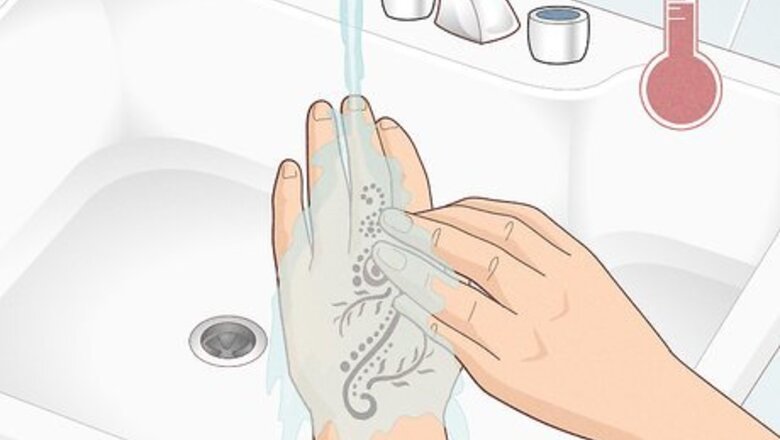
views
- Remove henna from your hand by repeatedly washing with warm water, letting whitening toothpaste sit on the hand for 10-20 minutes, and finally, scrubbing with oil and salt.
- To remove henna from your hair, cover your mane with oils, put on a plastic cap, heat your oiled hair with a hairdryer, sleep on the oil overnight, and wash it out in the morning.
- To remove henna from clothes, immediately blot with a clean, dry rag before scrubbing with dish soap and warm water, soaking the stain in warmed milk, and rubbing on some vinegar.
Removing Henna From Your Skin
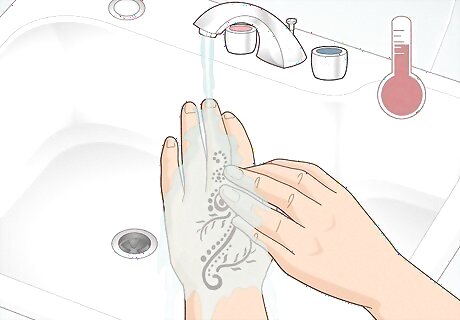
Wash your skin with hot water. Get the water as hot as you can stand and then run it over the area that is dyed. This will open your skin pores, which will allow the henna ink to be removed easier. You can either do this in the shower or in the sink. However, if you have a lot of henna to remove, it's probably easier to do in the shower. You can rub the area with your hands or a washcloth, but the water is mostly being used at this point to open up the pores.
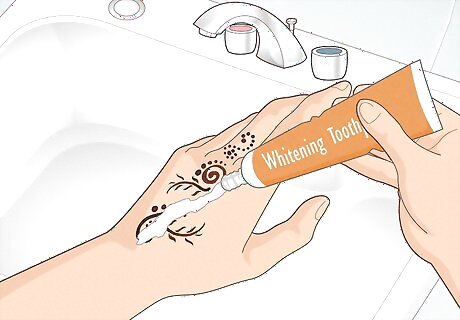
Cover the area with a whitening toothpaste. Whitening toothpaste has chemicals in it that will bleach out the henna, but it's mild enough that you can safely use it on your skin. Put enough on to cover the entire area that is dyed and make it thick enough so that you can't see the henna through it. Usually the kinds of toothpaste with flavors and multiple colors don't work the best. Try to use the kind that is plain mint and that doesn't contain dye.
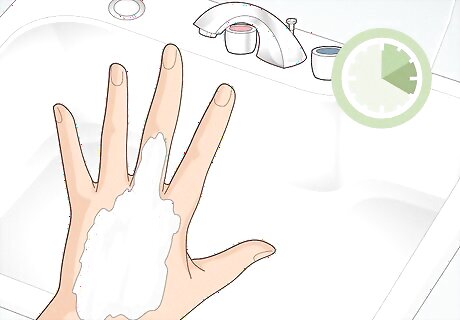
Wait for the toothpaste to get dry for 10-20 minutes and then wash it off. Look for the toothpaste to start cracking, that's how you'll know it's dry. The time it takes for the toothpaste to get this dry depends on what brand you use and the amount of toothpaste you applied. Wash the toothpaste off with warm water. Scrub the area with a washcloth or sponge while you are removing the toothpaste. Tip: It's important to let the toothpaste dry completely, or it won't remove the henna when you wash it off.
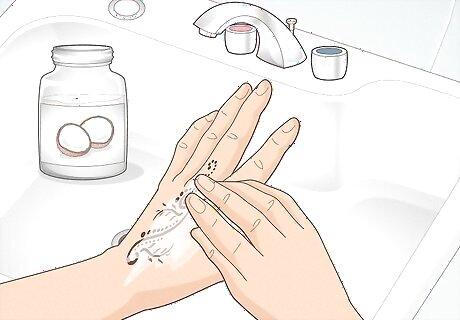
Use oil next if there is still henna to remove. Rub coconut oil or olive oil all over the area you want to remove. You'll want to do this over a sink or a bowl, as things may get messy. Smear a thick coat of the oil onto your skin. Once the skin is coated, leave it there and don't move it around. If you want to use coconut oil, you may need to melt it a little before you use it. Melting the coconut oil in the microwave for just a few seconds is the quickest option, although you can also melt it fairly quickly in a pan on the stove on low. However you melt it, just make sure the coconut oil isn't hot before you put it on your skin.
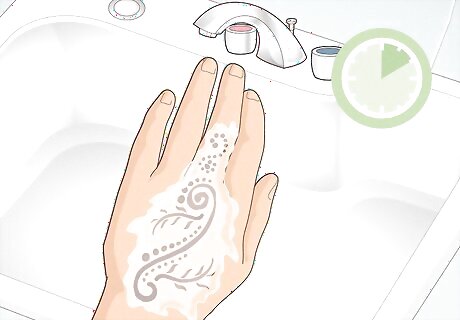
Leave the olive or coconut oil on for at least 10 minutes. When using oil, the longer you keep it on the better. This will give the oil a chance to get into the skin and to loosen up the dye.
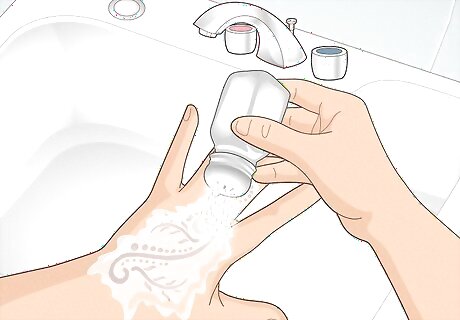
Add salt to the oil and exfoliate your skin. Once the oil has had a chance to get into the pores, adding coarse salt makes it into an exfoliating scrub. Rub the salt around the surface that has the henna using gentle, circular motions. You should not scrub so hard that it hurts your skin. It's better for the health of your skin to be gentle and to take your time.
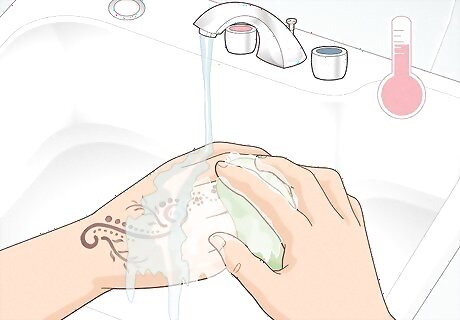
Wash off the oil and salt with warm water and soap. After you have scrubbed the surface of your skin, wash it off with warm water. It's important to use soap to get all the residue of the oil off your skin. Use a washcloth or bath scrubby to rub the surface of your skin as you wash it. This will help remove the dye while you are removing the oil and salt. Scrubbing your skin with soap can also speed up the fading.
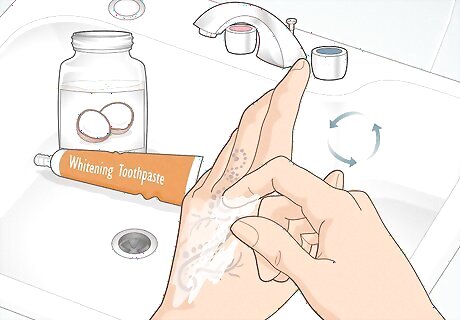
Repeat the toothpaste process and the oil scrub if the henna is not gone. It can take several rounds of soaking and scrubbing to get henna off your skin. However, how many rounds it takes depends on how deeply the henna dyed your skin and how your skin reacted to the henna, as everyone's skin is different. Even if the henna is not removed completely, soaking and scrubbing will reduce the amount of time the dye stays on your skin. Without help, henna stains take between 10-14 days to completely wear off.
Removing Henna From Your Hair
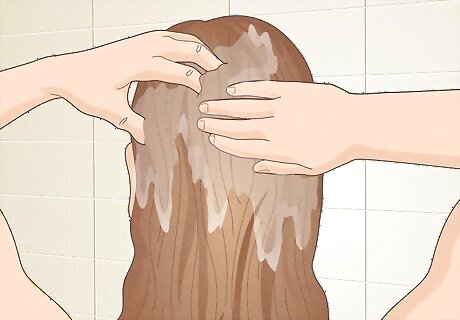
Cover your hair in olive, coconut, or argan oil, or a combination of all three. You want to apply enough so that your hair is saturated but not so much that it drips down off your hair. Start with a handful and massage it into your hair. Add more oil if some areas of your hair are not completely coated.Tip: This is easiest to do while in the shower, as any oil that drips can be easily cleaned up. Although henna is a temporary dye on skin, it permanently dyes hair. This means that it is harder to take out of hair than it is to take off your skin. However, this process will reduce the amount of henna in your hair, even if it can't remove all of it.
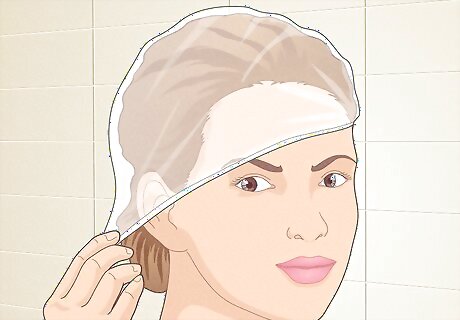
Wrap your hair in plastic. In order to keep the oil on your hair without getting it all over your clothes and body, it's important to wrap it in plastic wrap. Use kitchen plastic wrap and simply wrap it all around your head. Keep wrapping until all of your hair is enclosed in the plastic. You can also use a disposable plastic shower cap if you have one on hand. Have a helper do this if you have one available. It can be hard to get the whole area wrapped without some assistance.
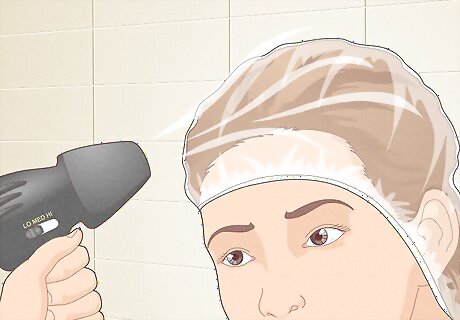
Heat your oiled hair with a hair drier. Applying a bit of heat can help the oil really get into the hair. Set the hairdryer to medium or low and run it over the entire surface of your wrapped up hair until it feels warm on your scalp. You don't want to heat the area so much that the plastic wrap melts. If your scalp starts feeling too warm, stop heating your hair. It's not necessary to heat it so much that you start to burn your scalp.
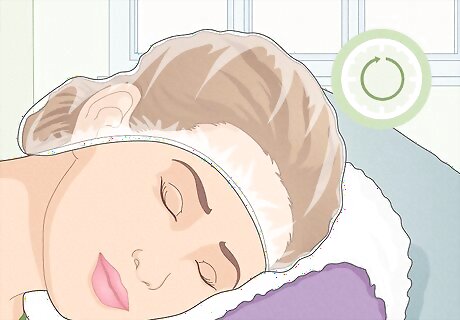
Keep the oil on overnight. You really need to let the oil to get into the inner layers of your hair so it can loosen up the dye. In order to do this, put a towel or other protector on your pillow and keep the oil and plastic wrap in place overnight. You can also put a shower cap over the plastic wrap to help ensure that the oil doesn't leak out onto your bed.
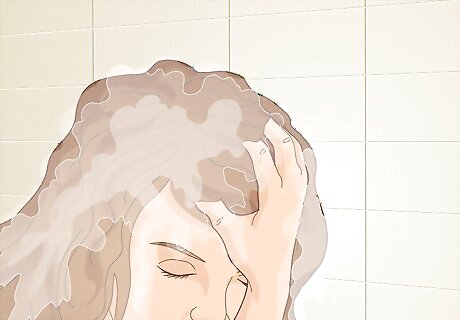
Shampoo your hair to remove the oil. It may take a large amount of shampoo, or a few rounds of shampooing, to get the oil out. Put the shampoo on your hair and spend a few minutes rubbing it in. Once you have created lots of suds, rinse it out with hot water. If your hair still feels oily after using your shampoo, try shampooing it once again. It can take a lot of shampoo to break down and remove all the oil.
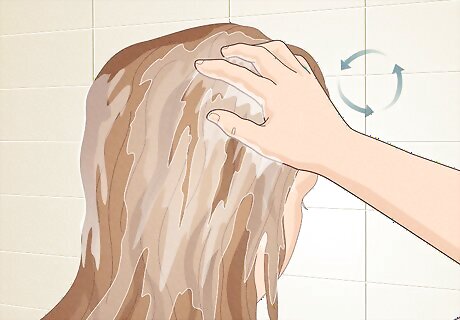
Repeat the process if too much of the color remains. Since henna is a permanent dye in hair, it may take several rounds of oil to fade your hair color. However, with a few rounds of this oil treatment you should be able to reduce the amount of color in your hair.
Removing Henna From Your Clothes
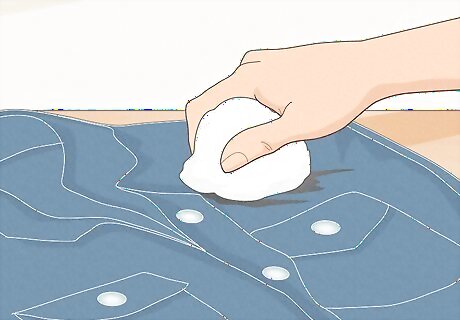
Blot stains immediately. While the henna is still wet, blot the area with a clean, dry rag. Stick to blotting and don't rub the area yet, as this can cause the henna to get deeper into the fabric instead of removing it.Tip: If you have a henna stain on your furniture or upholstery, make sure it's okay to get the fabric wet before you try this. If the stain is on a piece of clothing you are wearing, put a towel behind the stain and then use another towel to blot the top of it. This will keep the henna off your skin. Switch areas of the towel you are using after every couple blots so that you don't reapply the dye you've gotten on the towel.
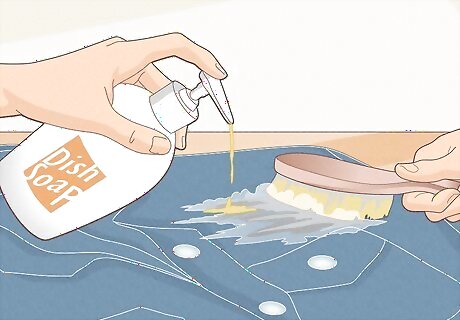
Scrub the area with laundry or dish soap and warm water. Once you have removed as much of the henna as you can with blotting, apply soap directly onto the stain. Add a bit of cool water to dampen the area and then rub it with a soft scrub brush. Rinse the area with cool water after a couple of minutes. This will let you inspect the area and determine whether you need to do another round of soap and scrubbing. It can be hard to determine if the henna is gone once the fabric is wet. Keep scrubbing until you can't see any sign of the dye remaining. A good brush to use to scrub the dyed area is an old toothbrush.
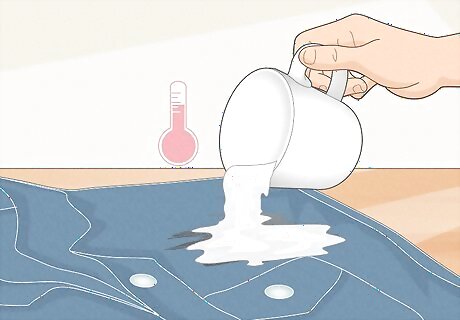
Soak the dyed area in warmed milk if the henna is still there. Warm up a cup of milk on the stove or warm it in the microwave. Then, put it in a shallow bowl and submerge the dyed area in the milk. Keep the fabric in the milk for about 30 minutes. Warmed milk can help break down the henna and remove some of the potential stain. After you let the area soak, put a few drops of soap on the dyed area and scrub it to remove the dye and the milk.
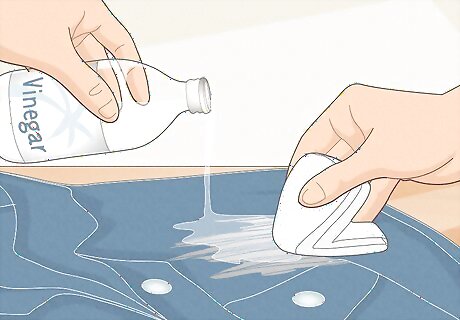
Rub the stained area with hydrogen peroxide or vinegar if the stain remains. If you have not been able to get the henna out of your fabric with soap or milk, you can try to remove it with a household chemical. Hydrogen peroxide and vinegar are both great at removing most stains. Simply soak the dyed area in the chemical, let it sit for a few minutes, and then rinse if out with cool water. Do repeated soaks to break down the dye and remove it. If the henna has gotten on a piece of white fabric, use a soak of 1 part bleach to 3 parts water to remove the henna.















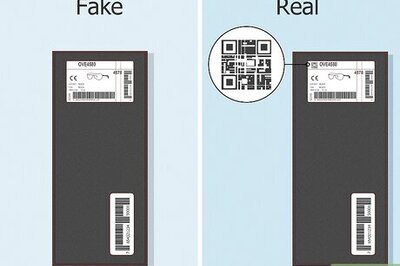

Comments
0 comment